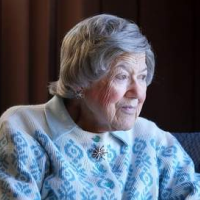How One Mistake about a Woman’s Death Cascaded into a Life-Threatening Ordeal
 Elaine Richter (photo: Conner Jay, Santa Rosa Press Democrat)
Elaine Richter (photo: Conner Jay, Santa Rosa Press Democrat)
Life is crummy when you’re dead.
Elaine Richter, 90, found that out the hard way when she received notice of her death from her health care provider, Kaiser Permanente, and then watched her life quickly unravel.
Chris Smith of the Santa Rosa Press Democrat told the Rohnert Park resident’s story last week, and as horrifically odd as it sounds, something like it is triggered 38 times a day nationally when the Social Security Administration wrongly declares someone dead.
Kaiser’s letter notifying Richter of her untimely passing came from its Medicare department on November 29. Medicare and Kaiser officials told her they got the word from the Social Security Administration, but before the retired social worker could get over there to investigate, her ATM card was deactivated, her credit card was frozen and access to her credit union was blocked.
The credit union then turned away her direct-deposit veteran’s pension payment (she served in World War II) and a prescription went unrenewed at her pharmacy. Spousal Social Security benefits from her deceased husband stopped.
On a hunch, Richter inquired about her husband’s ex-wife of 40 years ago and found that the previous Mrs. Richter had recently died. The woman had also been collecting spousal support and both of them shared his Social Security number, followed by a different letter. Someone had got them confused.
Armed with that information and a ton of documents identifying her as being her, she convinced the Social Security Administration into commencing a resurrection. Although she was reanimated a short time later, not everyone is as successful as Richter and the experience exposes a victim to identity theft.
A 2011 story in CNN Money said that of the 2.8 million people reported to the administration, one in 200 is incorrectly entered into the official Death Master File (DMF). That’s 14,000 a year. CNN told the story of a woman was declared dead because of a typo by a funeral director. Laura Brooks of Spotsylvania, Virginia, a severely-depressed 52-year-old mother of two stopped receiving her disability checks and bounced rent and student loan checks.
It took two months for the mess to be straightened out, but Brooks was not reimbursed for the missed disability checks. And she did not receive any official acknowledgment of the mistake.
The master file is a database containing more than 86 million records of everyone who has died since the 1960s. It includes, when possible, the Social Security number, name, date of birth and date of death of each decedent. The file, which is available as a free app for iPhones and Android phones, is not only used by the Social Security Administration and other government agencies, according to the SSA website:
“Medical researchers, hospitals, oncology programs all need to track former patients and study subjects. Investigative firms use the data to verify the death of persons, in the course of their investigations. Pension funds, insurance organizations, Federal, State and Local governments and others responsible for payments to recipients/retirees all need to know if they might be sending checks to deceased persons. Individuals may search for loved ones, or work toward growing their family trees. Professional and amateur genealogists can search for missing links.”
In addition to declaring living people dead, the Social Security Administration also occasionally fails to recognize those who truly are. A report (pdf) from the inspector general in July 2012 found that the administration had failed to properly record the deaths of 1.2 million people.
–Ken Broder
To Learn More:
Disproving Her Death Quite an Ordeal for Rohnert Park Woman, 90 (by Chris Smith, Santa Rosa Press Democrat)
Judge Orders Man To Stay Dead Despite His Insistence He's Alive: Could You Be Next? (by Kelly Phillips Erb, Forbes)
Social Security Wrongly Declares 14,000 People Dead Each Year (by Blake Ellis, CNN Money)
“Resurrected,” but Still Wallowing in Red Tape (by Alex Johnson and Nancy Amons, NBC News)
Social Security Administration Failed to Record more than a Million Deaths (by Noel Brinkerhoff, AllGov)
- Top Stories
- Controversies
- Where is the Money Going?
- California and the Nation
- Appointments and Resignations
- Unusual News
- Latest News
- California Forbids U.S. Immigration Agents from Pretending to be Police
- California Lawmakers Urged to Strip “Self-Dealing” Tax Board of Its Duties
- Big Oil’s Grip on California
- Santa Cruz Police See Homeland Security Betrayal in Use of Gang Roundup as Cover for Immigration Raid
- Oil Companies Face Deadline to Stop Polluting California Groundwater





